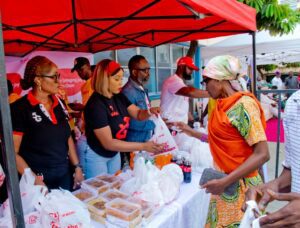
Inflation, insecurity: Banks record N182.7bn bad loans in six months
…As NPL of Union Bank, FCMB, Sterling Bank rise by 1%, 46%, 60.6%
…Bad loans due to inflation, insecurity, other economic realities — Chizea
By Uthman Salami, Ariemu Ogaga, Matthew Denis and Philemon Adedeji
A total of four banks Non-performing loans (NPLs) increased to N182.7 billion during half year (H1) 2022, representing 12 per cent decrease from N207.6 billion reported as of December 2021, this is according to the Nigerian Newsdirect investigation.
According to Investopedia, “A nonperforming loan (NPL) is a loan that is in default due to the fact that the borrower has not made the scheduled payments for a specified period.
Although the exact elements of nonperforming status can vary depending on the specific loan’s terms, ‘no payment’ is usually defined as zero payments of either principal or interest.
According to the financial reports of the banks, released in June/July this year to the Nigerian Stock Exchange.
The bad loans, according to financial analysts, could be linked to the downturn in the economy as a result of the insecurity, inflation and other economic factors.
The financial reports, which were analyzed by Nigerian NewsDirect, revealed that some of the four leading banks recorded an increase in their bad loans while others recorded a decrease during the year under review, compared to the previous year.
The four banks are, Union bank, First bank Holding of Nigeria, Sterling Bank, FCMB group
“The specified period also varies, depending on the industry and the type of loan. Generally, however, the period is 90 days or 180 days.”
Union bank in half year 2022 reported N38.3 billion NPL by value in 2022, representing an increase of 1.89 per cent from N38.67 billion reported as of December 2021, while Sterling bank grew its NPL to N8 billion in half year 2022 from N4.98 billion recorded as of December 2021, representing 60.6 per cent increase.
Others are First Bank Holding of Nigeria with N182.6 billion NPL in H1 2022 from N207.4 billion reported as of December 2021, reflecting a decreased of 12 per cent, while FCMB group 46 per cent increase in NPL to N52.7 billion in H1 2022 from N35.89 billion reported as of December 2021
Other key indices of the results include Sterling bank Plc reporting 41 per cent increase in profit after tax to N8.0 billion in its half year (h1) unaudited financial statement for period ended June 30, 2022 from N5.7 billion reported in corresponding half year results.
The lender’s gross earnings that grew by 16.5 per cent to N78.4 billion in H1 2022 as compared to N67.3 billion reported in H1 2021, was a combination of a 48.2 per cent increase in non-interest income and an 8.8 per cent growth in net interest
Specifically, First City Monument Bank, a listed bank on the Nigerian Exchange Limited (NGX), also grew its Profit After Tax by 73.1 per cent to N15.428 billion in half year H1 2022 from N8.910 billion in the corresponding year 2021
Also the rate at which the Union bank offered loans and advances to customers depreciated to 0.4 per cent to N865 billion as of June 30 2022 from N868 billion loan offered to customers in the 2021 full financial year.
Other key highlights of the financial statement include a seven per cent growth in customers deposit which rose significantly to N1.450 trillion as of June 30, 2022 from N1.356 trillion in 2021.
However, Union Bank of Nigeria’s Profit After Tax (PAT) rose by 12.6 per cent to N11.074 billion in H1 2022 from N9.836 billion achieved in H1 2021.
Profit Before Tax (PBT), recorded for the period, increased by 6.7 per cent to close at N12.3 billion in H1 2022 from N11.594 billion in H1 2021.
…Inflation, other economic realities reason for bank’s bad loan — Chizea
The Managing Director and Chief Executive Officer, BIC Consultancy Services, Dr. Boniface Chizea in an exclusive chat with Nigerian NewsDirect Newspaper in Sunday said inflation, other economic realities reason for bank’s bad loan.
He stated that banks need out of box survival strategies to weather the storm.
According to him, “Banking and bad loans go together. It is not possible to operate a Bank during a financial year without bad debts for which the bank must make provisions for.
“What often is at stake is to ask whether the rates of loan loses are in keeping with trends as ascertainable by appropriate loan loss ratios such as loan loss to Shareholders funds etc.
“In the current Nigerian economic environment, it is no brainer to expect that bad loans will increase as borrowers operations are undermined by the uncertain hostile environment.
“A loan becomes bad when the borrower is unable to keep to loan repayments obligations. There are prudential guidelines that imposes unanimity amongst banks with regard to the classification of bad loans.
“And because of the inevitability of bad loans; most lenders would insist on collateral securities. As a matter of fact banks are required by the regulator to demand collateral securities before extending any loans.
“But this requirement should be deployed with a mindset that the credit officers must ensure that the loan is viable and then security is obtained since the unanticipated could happen in the intervening period.
“Some lazy bankers ended up literally turning the granting of loans as akin to pawnbroking which is an abuse of the provision. Therefore if you deposit the papers to a property on Lagos Island, you are almost sure that your loan request will be approved.
“Banks would do credit analysis to confirm that a loan proposal is viable. Good credit officers know what to look for and must be on the lookout that projections are not unusually optimistic. When undertaking appraisals, experience informs that it is eminently better to err on the side of caution.
“But despite due diligence, something unexpected could still crop up particularly in an environment which is not stable due to many exogenous factors and in the particular Nigerian situation due to fluctuations often in the rate of exchange of the Naira.
“The situation of the Nigerian economy today affected by escalating rate of inflation is the sort of environment where ability to keep fidelity with loan obligations is very difficult.
“Input costs are rapidly increasing and it might not be possible to simply pass such factor costs increase to the consumer. Even the ability to do so is crucially dependent of price/demand elasticities.
“Rising debt stock negatively impacts on shareholders funds as the profit volume is undermined due to loan loss provision which is a Profit & Loss Statement item. And as the profit position is affected as should be expected, it negatively affects the share prices at the Stock exchange.
“Severe reduction in profit levels sometimes if recalcitrant might lead to staff rationalization which adds to the numbers of those at the unemployment market thereby worsening the misery index in the land. As the unemployed is literally in the devil’s workshop social crimes mount making life unsafe for everybody.
“All economic agents in the economy today are at pains due to one reason or another but no thanks to Covid-19 pandemic whose negative consequences still linger which became exercibated as a result of the Russian/Ukraine war.
“The challenge before us all is to think outside the box for survival strategies”, he stated.
Dire consequences ahead for both banks, customers — Ajisafe
On his part, an economic analyst and Professor at the Department of Economics, Obafemi Awolowo University, Adebayo Ajisafe said surge in NPL will lead to grave consequences for both banks and customers.
He said, “A non-performing loan (NPL) is a loan that is in default because the borrower has not made the scheduled payments for a specified period. Although the exact level of nonperforming status can vary depending on the specific loan’s terms.
“That is, when the borrower has not made any payments of either principal or interest. The NPL ratio calculates the percentage of bank loans that are either not being serviced effectively or have gone bad entirely.
“The non-performing loans of commercial banks in Nigeria jumped from 4.84 per cent in February 2022 to 5.3 per cent in April 2022. This in effect shows that NPLs has been on the increase in recent times.
Explaining the consequences of bad loans on the banks, he said that “Implications of non-performing loan to the bank include: Reduction in the profitability of the banking industry. This is because part of the profit of the bank will be set aside as provision for such loan; Decreasing revenues of the banks; Eroding retained earnings of the banks and capital; Reduces the returns on asset; It also leads to slow economic growth.”
While explaining the implication of non-performing loan on customers, Ajisafe said, “It distorts allocation of credit to the customers; It becomes more difficult for the customers since the bank will introduce more stringent measures in acquiring the loan; Lack of trust on the side of customers who may wish to deposit money; The customers will be forced to liquidate any assets used as security for the loan,” he disclosed.
Banks should revisit loan payback mechanism — Ayodeji
On his part, the Vice Chairman of Nigerian Association of Small Medium Enterprise (NASME) North Central, Prince Ajisefinni Ayodeji Tajudeen said banks should endeavor to revisit their loan payback mechanism to reduce bad loans.
Change in climate weather, inflationary rate among others contribute to these loans.
He stressed that the bankers are expected to be more interested in monitoring customer business and not careless how customer payback loan.
He said “This can be achieved by engaging a BDSP for each customer loan is given while service charge is charge to customers at subsidized rate.
“Refinancing of business with good prospect despite the fact of outstanding loan can help to pay back both loan.”
Tajudeen noted that it is advisable not to use short loan for long term businesses because such result to bad debts.Moreover, customers need loan management training because diversion of loan lead to bad loan.



